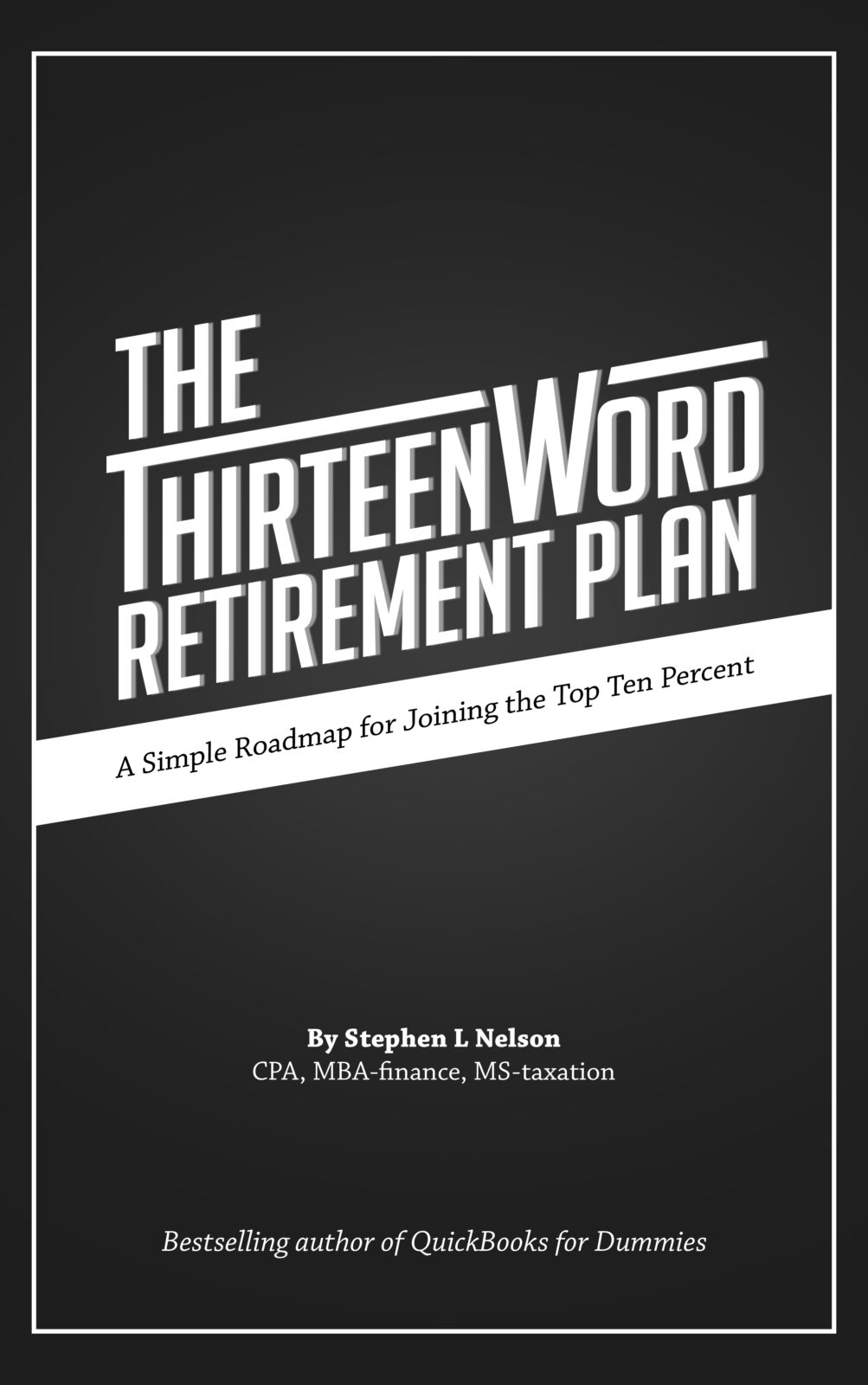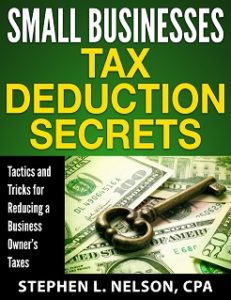 This post talks about reasons to avoid the small business entrepreneur route to financial independence.
This post talks about reasons to avoid the small business entrepreneur route to financial independence.
I want to talk about this topic because last week’s blog post promoted the idea that small business entrepreneurship counts as a valid approach for achieving financial independence.
While I think the argument presented in last week’s post is correct, you need to know that like every strategy for achieving financial independence, the small business entrepreneurship strategy suffers certain flaws.
Specifically, I see five practical flaws or problems with the idea that you can use small business entrepreneurship as a way to make a living, achieve financial independence, and then prepare for retirement.
Flaw #1: You’ve Already Got a Pretty Good Gig
You know what? You may already have a pretty secure job you like. Your job may compensate you with a better-than-average salary and great tax-free fringe benefits. You may work with people you like. Prospects for the industry your employer operates in may be good and getting better. And what’s more, you may have a great aptitude to do the things you’re already doing in your regular job.
In this sort of situation—I’m just going to say it— I don’t think small business entrepreneurship makes a whole lot of sense.
Small business ownership requires you to bear additional risk, make extra effort, and invest your family’s (probably scarce) financial resources. To me—and I’ve spent almost my entire adult life running my own small business—those investments of your time and treasure just don’t seem to make as much sense if you’re already, right now, someplace “pretty darn good.”
Flaw #2: Mostly-Complete “FIRE” or “Bogleheads” Plan
Another reason to avoid small business ownership? If you’ve mostly completed a “Mr.-Money-Mustache-style” FIRE plan or a “Bogleheads-style” retirement plan, I don’t think the small business entrepreneurship route makes much sense either. Let me explain.
If you have mostly completed a Bogleheads-style financial plan, you’ve nearly won the game. (Good job, by the way.) The big flaws I pointed out a couple weeks ago in another blog post aren’t even risk areas for you anymore. You simply don’t have much reason to change course.
And if you’ve mostly completed a Mr.-Money-Mustache-style FIRE plan? Well, in your case, sure, small business entrepreneurship may make sense. But what you want to do, if you’ve nearly achieved FIRE status, is simple: finish the plan. You can, once you are retired, start a small business if you want. (Running a small business in retirement can actually be a pretty good idea.) But gosh you ought not change course late in a plan. Especially when the plan has worked. (Good job on this, too, by the way.)
 Free Download: If you are just starting out with a Bogleheads-style or Mr. Money Mustache-style retirement plan, I have a free retirement planning e-book you might might find truly useful…
Free Download: If you are just starting out with a Bogleheads-style or Mr. Money Mustache-style retirement plan, I have a free retirement planning e-book you might might find truly useful…
My little “Thirteen Word Retirement Plan” e-book outlines a simple approach that many people can use to join the top ten percent…
More information appears here “Thirteen Word Retirement Plan“.
Flaw #3: Unbearable Financial or Emotional Risk
On to another practical flaw…
Running a small business jacks your risk. Now, of course, relying on a single employer causes you to bear quite a bit of risk, too.
But small business ownership means you’re risking capital and time in a venture that may provide plenty of upside, but also surely presents big downside risks, too.
Even beyond the financial and entrepreneurial risk, small business may emotionally burden the entrepreneur, his or her spouse, and even the entrepreneur’s family with extra stress.
Many people just aren’t comfortable bearing the fluctuating income that a small business often produces.
Many people don’t like, for good rational reasons, having a large percentage of the family net worth tied up in a single high-risk and potentially-leveraged asset—even if the asset generates a generous return on investment.
If you or your family aren’t comfortable bearing the risk, therefore, I think that discomfort counts as a good reason to avoid small business entrepreneurship. A really good reason.
Oh, and a related comment: If you or your family don’t think there’s a lot of risk? Yeah, that’s going to be a problem too. (I say this because if you guys think there’s not going to be risk, possibly that’s because you guys just don’t yet understand what the family is getting into.)
Flaw #4: Inability to Cross Knowledge Thresholds
Let me now mention something that represents another flaw, or problem, related to small business entrepreneurship.
My observation and then the popular academic research support the idea that you need a good amount of knowledge and information about how to run a business in order to succeed.
You’ll need explicit knowledge of the sort covered in any undergraduate business major program, including stuff like how to do basic accounting. (Explicit knowledge is the stuff you can learn in any traditional manner such as from a class or book.)
You will also need tacit knowledge about the industry in which you operate, your competitors, the products and services you sell, and a whole bunch of other stuff, too. (Tacit knowledge refers to knowledge you can’t get any place like a book or classroom and so need to learn in all sorts of other, informal, unstructured, and often inefficient ways.)
Note: Harvard Business Review published a classic discussion of this idea nearly thirty years ago, which is available here.
You will, therefore, need to either possess or quickly acquire both this explicit and tacit knowledge in order to prudently pursue the small business entrepreneurship route to financial independence.
If you’re unable or unwilling to quickly get the required knowledge, small business entrepreneurship probably doesn’t work. At least in my opinion.
 Tip: While we’re on the subject of stuff you want or need to know, can I mention something?
Tip: While we’re on the subject of stuff you want or need to know, can I mention something?
Federal and state tax laws provide small businesses with dozens of powerful tactics for cutting taxes.
If you want help or more information about this, consider our popular downloadable ebook “Small Businesses Tax Deduction Secrets“.
Flaw #5: No Slacking Off
One final quick flaw related to small business. Some jobs let you coast. Some jobs let you, let’s be honest, slack off. You can’t do that with a small business.
You don’t need to work 60 or even 40 hours a week. But you do need to continue earning the patronage of your customers and clients. And that means you need to provide them with better-than-average products and services.
Further, you need to continue to deserve the loyalty of key employees and vendors. Those folks probably lose patience, understandably, if you aren’t putting anything into the relationship.
Despite the picture portrayed in some movies and television shows, then, small business ownership doesn’t really ever let you check out of your business for extended time intervals. Sorry.
Final Remarks about Small Business Entrepreneur Route to Financial Independence
Two quick comments in closing about taking the small business entrepreneur route to financial independence.
First, if you’ve read the preceding paragraphs and think, “Well, yeah Steve, I get all that… but I still think it sounds like a good idea…”, then I think you should consider the small business entrepreneurship thing. Don’t forget about the stuff discussed in the preceding paragraphs. But don’t let my Debbie-Downer discussion spoil your dream.
Second, just so you know, the only real job I myself ever had was working at Arthur Andersen & Co, then the world’s largest public accounting firm, the first three years after I completed my MBA. After that job and one brief position with a venture capital funded startup, I always worked in my own small business. And, yeah, looking back, I wouldn’t do any differently second time around.
Other Posts for a Small Business Entrepreneur
Seven Reasons for Starting Your Own Business
Six Common Formulas for Small Business Success
Your Real Odds of Succeeding in Small Business
Steve
Regarding step #5 I have after 12 years in a small business finally found myself able to “check out”, although only on a couple of months basis.
.
After being discouraged by family (not directly involved in the business) from accepting a buy out offer I finally hired one of my very part time workers as a full time manager and am amazed at how quickly I was able to move into the passenger seat as opposed to the drivers seat. (although he may think I am still trying to hold the steering wheel)
We are a small manufacturing business in the Marijuana industry (not directly related to the end product) and having a manufacturing background I still enjoy the logistics and customer interaction end of the business leaving the labor and everyday hands on part to my manager.
As I write this email I am in my motorhome in the desert of SW Arizona watching the sun fill up my batteries and answering a couple of calls a day from customers and a daily call with the manager to insure that things are moving along well back up in SW Washington where I hear they are having a quite a bit of wind and rain.
I have enjoyed reading your blog for the last year and like the fact that you seem to show both sides of the coin to potential entrepreneurs
. Would you consider an article on how freeing it can be finding a manager to take over the day to day. I’ve had to figure it out for myself and would have started thinking about hiring someone to take over a long time ago had I know how freeing it is. Seems sometimes though we need to be introduced to such an idea before we can start to process and consider it so I’m only suggesting such an article to maybe introduce others to the idea and maybe get them thinking about it too.
Thanks for all the time you put into this blog. I had one once and the grind for daily content got old after only a few months.
Steve K
ghsebldr